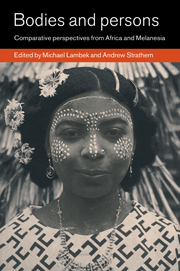Book contents
- Frontmatter
- Contents
- List of illustrations
- List of contributors
- Acknowledgments
- 1 Introduction: Embodying sociality: Africanist–Melanesianist comparisons
- Part I Transcending dichotomies
- 2 “It's a boy,” “it's a girl!” Reflections on sex and gender in Madagascar and beyond
- 3 Modernity and forms of personhood in Melanesia
- 4 Refiguring the person: the dynamics of affects and symbols in an African spirit possession cult
- 5 Body and mind in mind, body and mind in body: some anthropological interventions in a long conversation
- Part II Transitions, containments, decontainments
- Part III From exchange to history
- Bibliography
- Index
3 - Modernity and forms of personhood in Melanesia
Published online by Cambridge University Press: 05 June 2012
- Frontmatter
- Contents
- List of illustrations
- List of contributors
- Acknowledgments
- 1 Introduction: Embodying sociality: Africanist–Melanesianist comparisons
- Part I Transcending dichotomies
- 2 “It's a boy,” “it's a girl!” Reflections on sex and gender in Madagascar and beyond
- 3 Modernity and forms of personhood in Melanesia
- 4 Refiguring the person: the dynamics of affects and symbols in an African spirit possession cult
- 5 Body and mind in mind, body and mind in body: some anthropological interventions in a long conversation
- Part II Transitions, containments, decontainments
- Part III From exchange to history
- Bibliography
- Index
Summary
Introduction
The insurrection on Bougainville, the cascade of new types of commercialism, mass media advertising, the continuing admixture of “Western” and local forms of medicine, the expansion of the public sphere, the penetration of the state into the recesses of domestic life, the reshaping and abstraction of labor, the use of education as an instrument of civic integration, and much else summarized by the term modernity underline the need to grasp the redefinition of local epistemologies brought about by the continuing encompassment of Melanesia by its “Other” – the West. At issue is how indigenous categories of knowledge and ways of knowing the world are not only transformed but permanently set in motion by the political economy of capitalism, the rise of the nation-state, the internationalization of the public sphere, the infiltration of Western popular and scientific cultures (from Christian religions and electronic media to medicine and anthropology), and interstate organizations such as the World Bank. In this context it is necessary to shape an ethnography of modernity that goes beyond an account of manifest change (e.g. adoption of Western religion, the advent of new practices of production and exchange, the implementation of a Western schooling system, the inscription of English) and grasps the transformations in knowing, agency, and subjectivity wrought by encompassment – the interplay among structures of different orders of magnitude, power, and intelligibility.
The construction of the “person” figures centrally in any such analysis because the concepts of personhood indigenous to Melanesia and Papua New Guinea in particular are significantly different from those embodied in Western practice and texts and presupposed by the colonially inspired political institutions that define the emerging states of Oceania.
- Type
- Chapter
- Information
- Bodies and PersonsComparative Perspectives from Africa and Melanesia, pp. 53 - 79Publisher: Cambridge University PressPrint publication year: 1998
- 127
- Cited by

